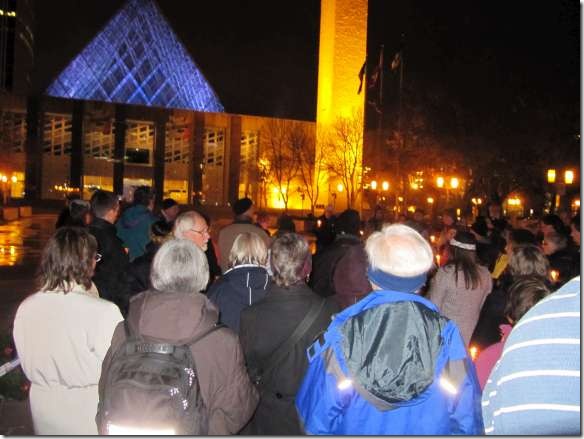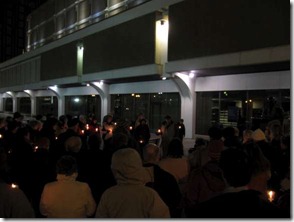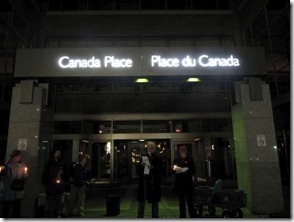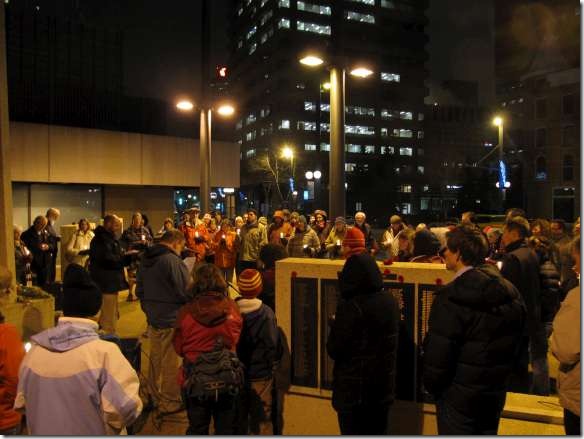"Our age not only does not have a very sharp eye for the almost imperceptible intrusions of grace, it no longer has much feeling for the nature of the violences which precede and follow them," says Flannery O’Connor. And so in O’Connor’s fiction, gothic violence and the grotesque act as a cudgel to awaken the sleeping to the reality of something beyond—like an intrusion of grace.
We live in a violent world. That’s hardly a secret. We have been formed by a culture of war and violence, the nature of which we are mostly unconscious of, and from which we wilfully keep ourselves hidden. Violence is so embedded that it’s impossible to imagine a world without it. That we live in an incarnate world sustained by intrusions of grace, well, that’s a little less obvious—almost imperceptible.
Two days ago our country intentionally remembered war. “Lest We Forget" was on billboards and on the front of buses. We remembered, so to honour the war dead, and we remembered so that we can in some way dispel war, so that at least violence of the scale once experienced, can be named and thwarted. And we hope that in the naming, in the remembering, something like grace and peace may appear.
Of course war cannot create peace and violence is never the cause of grace; but it can, in its gross distortions of social solidarity and communal life, reflect back to us our own propensity toward envy and rivalry, and in this uncovering, perhaps give us the unwelcome gift of seeing ourselves as we truly are—which if it happens is an occasion of mercy.
A personal and writerly goal I repeatedly come short of, which is never less a goal, is to stay awake to those intrusions of grace and occasions of mercy. And such was this past Friday where 30 or so people took the afternoon to study peace, and then took the evening to walk and pray, from City Hall to Canada Place, from the Gandhi Memorial to the War Memorial.
And we sang that old promise: to study war no more. But with the understanding that if we are blind to the nature of violence, and if we miss the intrusions of grace, then war, rivalry, ongoing reciprocal violence will remain our reality.
Once in our history the nature of violence was laid bare through a definitive intrusion of grace. And no one wanted to see. Once, the truth about human and social identity was spoken, and no one wanted to hear. Two thousand years later, through two global wars, the invention of a nuclear end, many genocides, and an imminent ecological disaster, and still we refuse to see and hear.
To take a day to remember and honour those who died fighting for our country is good. But it’s not, and never was, good enough. For if we stop short of trying to authentically identify with not merely our own, but all victims of war, and all the fallen, then we have already forgotten. Because failing to see ourselves as original combatants, failing to understand the (Good Samaritan) point about who our neighbour is simply leaves all the old mechanisms of sacrificial violence in place.
In effect, continuing to believe that war is occasionally necessary and normal, and that violence is in some way part grace, smothers every intrusion of grace; and it is this that even now is ushering in our apocalyptic era. That we Christians, above all, have failed to see and hear the living words of the one we purport to follow, and have even used the texts as justification for war and sacrificial violence—unconsciously giving the nod to Caiaphas over Christ—is perhaps our greatest shame.
Yet, despite our failure there are still intrusions of mercy. And if time is no longer one of them, perhaps violence’s own undoing is. For we are, as no other age has been, witnesses of violence’s growing excesses; and in this, we see its utter ineffectiveness to create or change anything—except, as Rene Girard says, to escalate to extremes. The choice is now plain. To not choose complete repudiation of violence is to choose annihilation. Seeing the truth behind the false reality of violence to the extent that these two alternatives are now clear, is not a prelude to despair, but of hope—a luminous intrusion.





The definitive intrusion of grace – beautiful!
Thank you Sam!